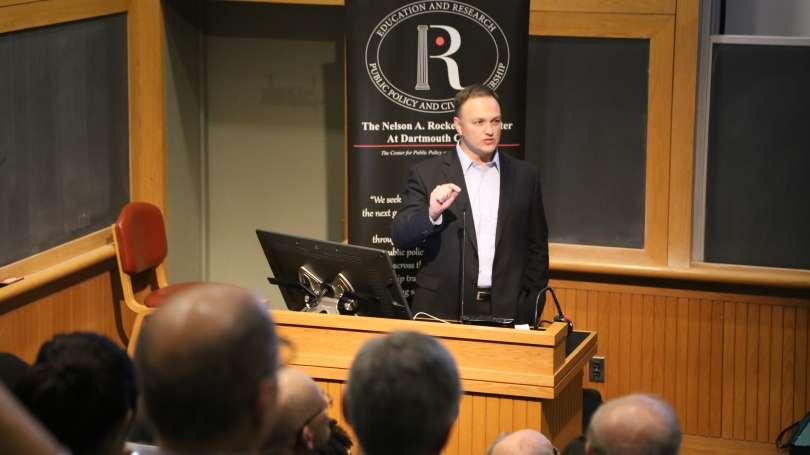
- Public Policy
- Leadership
- Funding
- News & Events
- About the Center
Back to Top Nav
Back to Top Nav
Back to Top Nav
Back to Top Nav
Public policy issues are complex and multilayered, spanning multiple disciplines in the academic world. For this reason, the Rockefeller Center has an active program of support for faculty interested in a multidisciplinary approach to research and scholarly collaboration.
Faculty can utilize research grants offered through the Center to fund the beginnings of promising projects. In many cases, the Rockefeller Center’s funding program is able to fund initial research in its exploratory phase that more traditional sources of funding would not approve.
“The Rockefeller Center’s Faculty Research Grant served as seed money that led to our successful proposal,” says Professor Christopher Sneddon of Geography and Environmental Studies. Working alongside Department of Geography colleagues, Coleen Fox and Frank Magilligan, these three scholars aimed to identify key gaps in scholarship surrounding dam removal. “The grant from Rocky was important for allowing us to achieve our research goals.”
Faculty can also benefit from classroom enhancement grants, which can cover costs associated with inviting guest speakers to the classroom or short excursions out of the classroom. In addition, the Center sponsors on-campus faculty workshops; public lectures featuring distinguished scholars, political figures, journalists, and other civically engaged leaders and activists; and large conferences involving dozens of scholars from on and off campus. Three examples from the past year show the range of the Rockefeller Center’s support for social science research within and across departments.
First, building on a long history of collaboration with departments at Dartmouth, the History Department launched the Dartmouth History Institute (DHI) in 2017 with crucial help from the Rockefeller Center. The annual multiday event brought together the best emerging Ph.D.’s in a specific subfield, along with leading senior scholars, to read and discuss their dissertations.
Anne Lester, Associate Professor of Medieval History at John Hopkins University, attended the Institute on New Directions in Medieval Religious History in 2018. She says, “The Dartmouth History Institute was an immensely rewarding experience for me and, I think, for all participants involved, senior and junior scholars alike. By bringing together a highly competitive group of recent or near Ph.D.’s who shared their research in the form of a dissertation or book chapter, DHI functions as a true laboratory for ideas.”
The Dartmouth History Institute allows Dartmouth faculty to gain exposure to the best new research, to identify emerging trends and methodologies occurring in graduate schools before publication, to raise the profile of the Dartmouth History department as an institution which fosters not only excellent teaching but historical research of the highest caliber, and to play a leading role in the larger intellectual work of their subfields. The Institute was an extraordinary success, both from the viewpoints of the faculty directors and from that of the invited participants. Dartmouth Professor of History Cecilia Gaposchkin shared, “It is safe to say that we would not have been able to organize these events without the funding provided by Rocky.” A third Institute, with support from the Rockefeller Center, is in the planning phases.
Second, in 2018, Marc Dixon, Associate Professor of Sociology at Dartmouth, approached Andrew Samwick, seeking feedback on his latest book project, Heartland Blues: Labor Rights in the Industrial Midwest. The Rockefeller Center coordinated and funded a manuscript review, bringing together six readers for a three-hour seminar in March 2019.
Dixon found the experience to be incredibly beneficial, saying, “As academics, we rarely get the chance to workshop our projects with a panel of experts in the same room. This kind of feedback is invaluable. I left the seminar with an entire notebook full of questions and comments, but also a clear path for improving the manuscript. It was a great experience and an incredible resource provided by the Rockefeller Center.”
The partnership with the Political Economy Project (PEP) is the third example of how the Center seeks to connect with those seeking an interdisciplinary approach to research and scholarly collaboration. PEP seeks to tackle broad questions at the intersection of economics, politics, and ethics across the disciplines of philosophy, history, sociology, government and economics.
“The idea is to open an academic framework that equips students to address these questions in a disciplined and rigorous way,” says Russell Muirhead, the Robert Clements Professor of Democracy and Politics in the Department of Government. This past year the Center has co-sponsored several PEP events, including “Has Liberalism Failed? An Exchange” and “Is Capitalism Rigged?” PEP recently entered its fifth year at the College, and in its next five years, hopes to utilize the Center’s funding opportunities to collaborate with the Center on bringing guest speakers to campus to engage in robust debate.